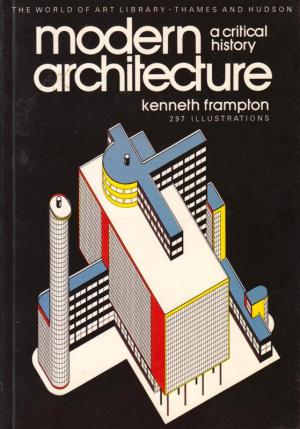Submitted by WA Contents
Kenneth Frampton named as recipient of Golden Lion for Lifetime Achievement at Venice Biennale
United Kingdom Architecture News - Apr 19, 2018 - 00:32 17878 views

British architect, historian, critic and educator Kenneth Frampton has been awarded with the Golden Lion for Lifetime Achievement at this year's Venice Architecture Biennale. The award was announced by the Board of Venice Architecture Biennale chaired by Paolo Baratta, upon recommendation of the Curators of the 16th International Architecture Exhibition, Yvonne Farrell and Shelley McNamara.
Described as "maestro" for "his critical approach to the teaching of architecture" by Paolo Baratta, the curators, Yvonne Farrell and Shelley McNamara emphasised Frampton's position in architecture "as the voice of truth in the promotion of key values of architecture and its role in society."
"Through his work, Kenneth Frampton occupies a position of extraordinary insight and intelligence combined with a unique sense of integrity. He stands out as the voice of truth in the promotion of key values of architecture and its role in society. His humanistic philosophy in relation to architecture is embedded in his writing and he has consistently argued for this humanistic component throughout all the various ‘movements’ and trends often misguided in architecture in the 20th and 21st century," said Yvonne Farrell and Shelley McNamara.
"His experience as a practicing architect has given him a deep understanding of the process of designing and crafting buildings. This makes him both more sympathetic and more critical of the various forms of the practice of architecture. His consistent values in relation to the impact of architecture on society, together with his intellectual generosity, position him as a uniquely important presence in the world of architecture," they emphasised.
Frampton, 87, a Honorary Member of World Architecture Community, was trained at the Architectural Association (AA) in London from 1950 to 1956. Frampton became technical editor of the journal Architectural Design in the early 1960s.
Kenneth Frampton has taught since 1972 at the Graduate School of Architecture, Planning, and Preservation at Columbia University, New York. As a prominent architect, writer and critic, as teacher and researcher, he has affected and affected several generations of students and architects. One of his most recognised recognised works in architecture literature is the "Modern Architecture: A Critical History."

One of Frampton's seminal books: Modern Architecture: A Critical History, first edition (1980)
His other seminal books include "Towards a Critical Regionalism" in which he argues the influence of architects to re-value context, place and culture. His "Studies on Tectonic Culture" was a leader in highlighting the connection between the language of construction and language of architecture. In "A Genealogy of Modern Architecture: Comparative Critical Analysis of Built Form", he captures with incisive clarity the inner workings of projects, de-coding them to make them legible for us all.
The President of La Biennale di Venezia Paolo Baratta stated that "there is no student of the faculties of architecture who is unfamiliar with his Modern Architecture: A Critical History. The Golden Lion goes this year to a “maestro”, and in this sense it is also intended to be a recognition of the importance of the critical approach to the teaching of architecture."
The Golden Lion for Lifetime Achievement will be presented to Frampton on Saturday, May 26th, 2018 at Ca’ Giustinian, the headquarters of Venice Biennale, during the awards ceremony and inauguration of the Venice Biennale 2018, which will open to the public at 10 am on that same day.
In the 2016 Venice Architecture Biennale, Brazilian architect Paulo Mendes was named as the recipient of the Golden Lion for Lifetime Achievement of the15th International Architecture Exhibition of Venice Architecture Biennale themed "Reporting From The Front", which was curated by Alejandro Aravena.
Top image: Kenneth Frampton. Image © Manuel Castells, Universidad de Navarra
> via Venice Biennale 2018
